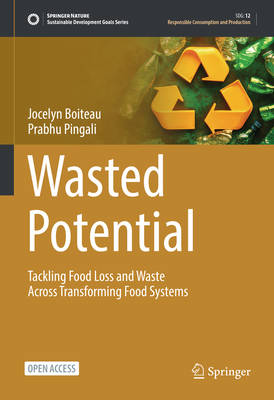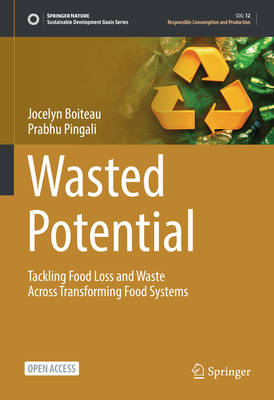
- Afhalen na 1 uur in een winkel met voorraad
- Gratis thuislevering in België vanaf € 30
- Ruim aanbod met 7 miljoen producten
- Afhalen na 1 uur in een winkel met voorraad
- Gratis thuislevering in België vanaf € 30
- Ruim aanbod met 7 miljoen producten
Zoeken
Wasted Potential
Tackling Food Loss and Waste Across Transforming Food Systems
Jocelyn Boiteau, Prabhu Pingali
€ 53,45
+ 106 punten
Omschrijving
This open access book examines how food systems reforms can support efforts to achieve SDG 12 by reducing food loss and waste in support of sustainable, safe, and nutritious diets in countries at different points of structural transformation. To achieve responsible production and consumption and support safe and nutritious diets, sustainable food system transformations are needed. Strategies to achieve this transformation focus on increasing production and supply of nutrient-rich foods; efficiently moving food along the value chain to make healthy foods accessible; ensuring that quality diets are affordable; and driving demand for healthy diets via informed food choice. By 2030, the United Nations aims to halve food waste and reduce food loss as part of Sustainable Development Goal target 12.3. Preventing food loss and waste, both in terms of food quantity and food quality, aligns with strategies to promote sustainable diets for all. The authors of this volume approach food loss and waste is in three unique important ways. First, while previous literature on the topic has focused on loss at the retail and consumer stages, this volume uses a food systems lens to examine food loss and waste across the entire range of actors and activities, from production to consumption. This enables an examination of feedback loops between food loss and food security as shifts in food systems occur at different stages of structural transformation. Second, while examining food loss and waste globally, the authors focus particularly on low- and middle-income countries. In doing so, they explore entry points for food loss and waste investment and intervention priorities to deliver healthy diets under different food system contexts. This is in contrast with the existing literature, which primarily uses cases from the U.S. and Europe to examine the phenomenon. Third, this book explores both the quantitative and qualitative dimensions of food loss and waste, using the latest evidence of measurement and prevention across disciplines and across all stages of structural transformation. 'Wasted Potential provides a rigorous and much needed systems perspective on food loss and waste, expertly bridging the gaps between food security, environmental sustainability, and economic development. Boiteau and Pingali offer a clear, actionable roadmap for aligning food system transformation with global development goals. Their comprehensive approach to tackling food loss and waste brings much-needed coherence to a fragmented field and offers practical guidance for future action to policymakers, researchers, and development practitioners.' - Jessica Fanzo, Professor of Climate and Director of the Food for Humanity Initiative, Columbia Climate School. The support of the Tata-Cornell Institute made this book possible.
Specificaties
Betrokkenen
- Auteur(s):
- Uitgeverij:
Inhoud
- Aantal bladzijden:
- 192
- Taal:
- Engels
- Reeks:
Eigenschappen
- Productcode (EAN):
- 9783031974106
- Verschijningsdatum:
- 27/10/2025
- Uitvoering:
- Hardcover
- Formaat:
- Genaaid
- Afmetingen:
- 185 mm x 259 mm
- Gewicht:
- 625 g

Alleen bij Standaard Boekhandel
+ 106 punten op je klantenkaart van Standaard Boekhandel
Beoordelingen
We publiceren alleen reviews die voldoen aan de voorwaarden voor reviews. Bekijk onze voorwaarden voor reviews.







